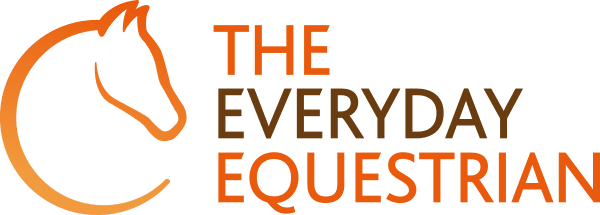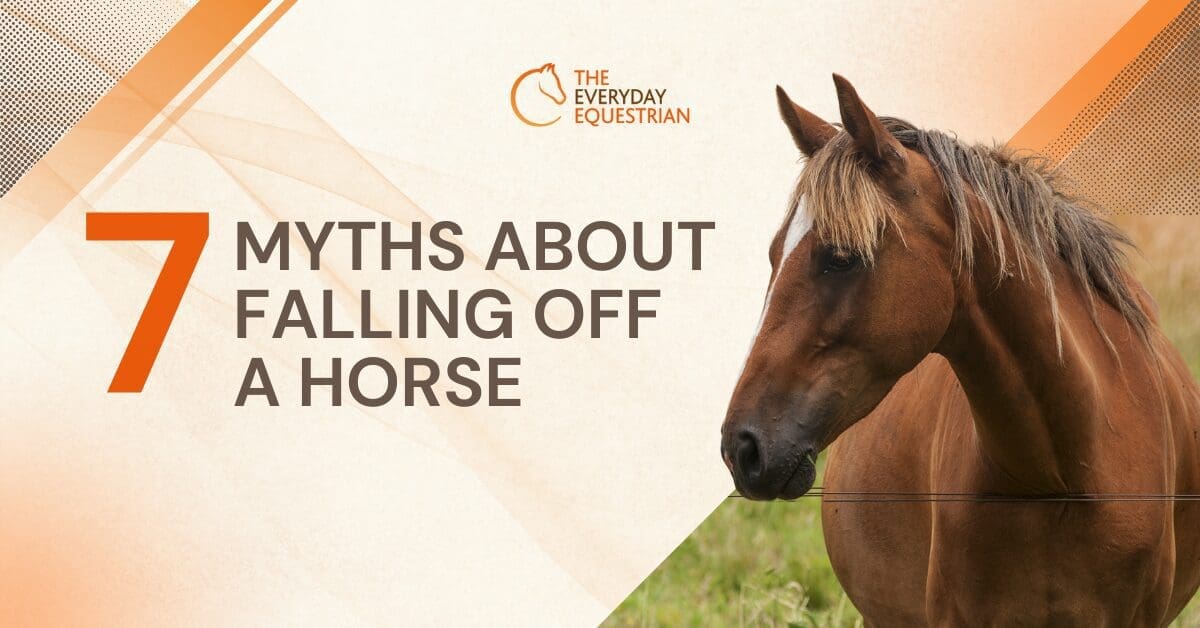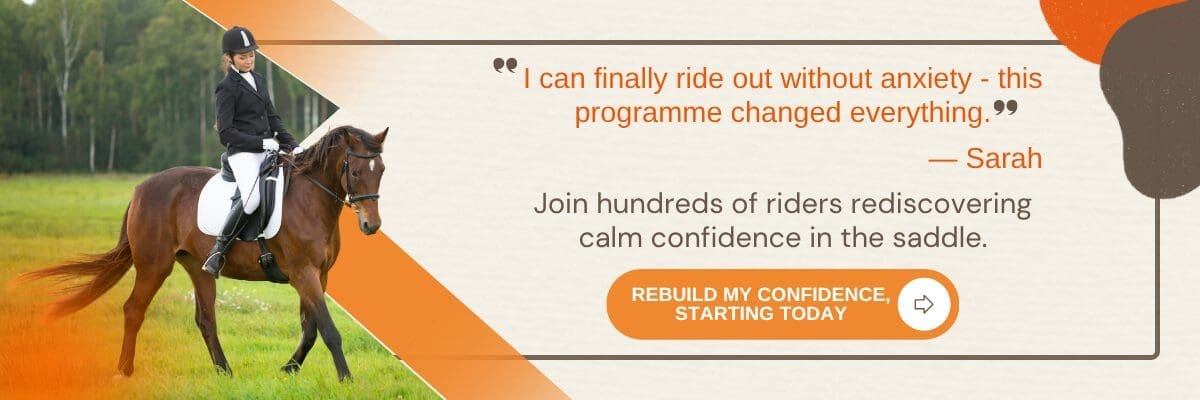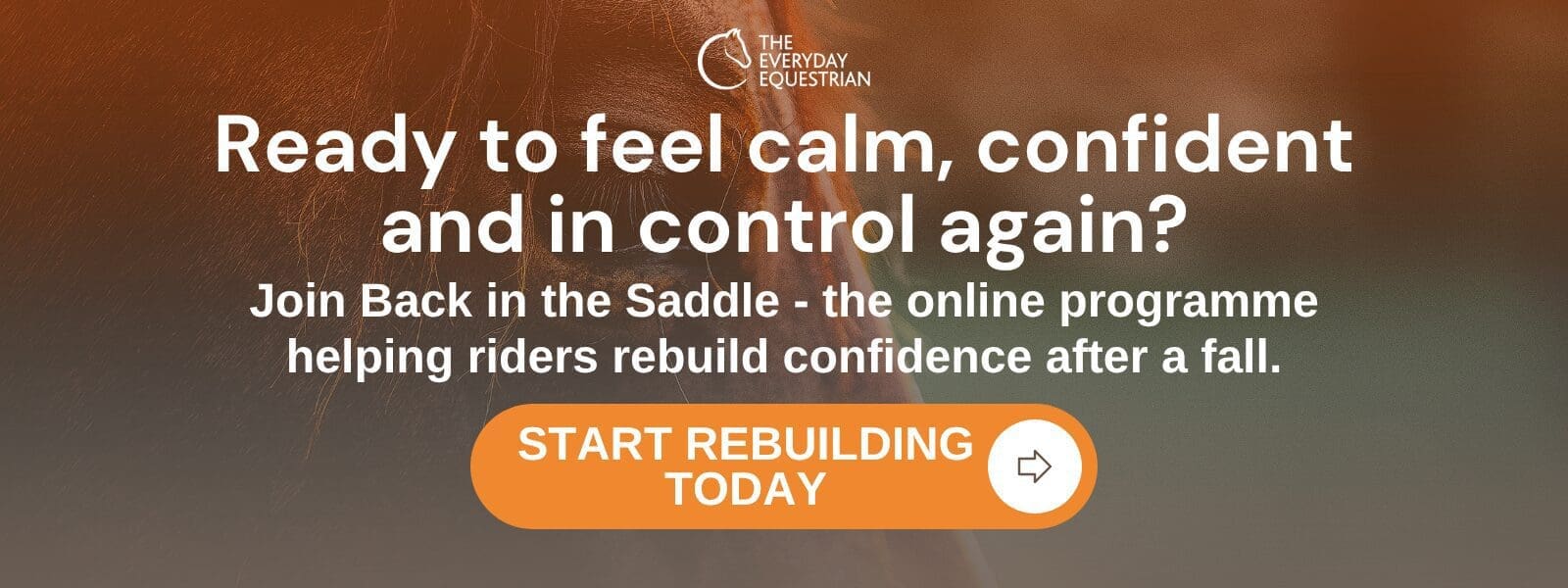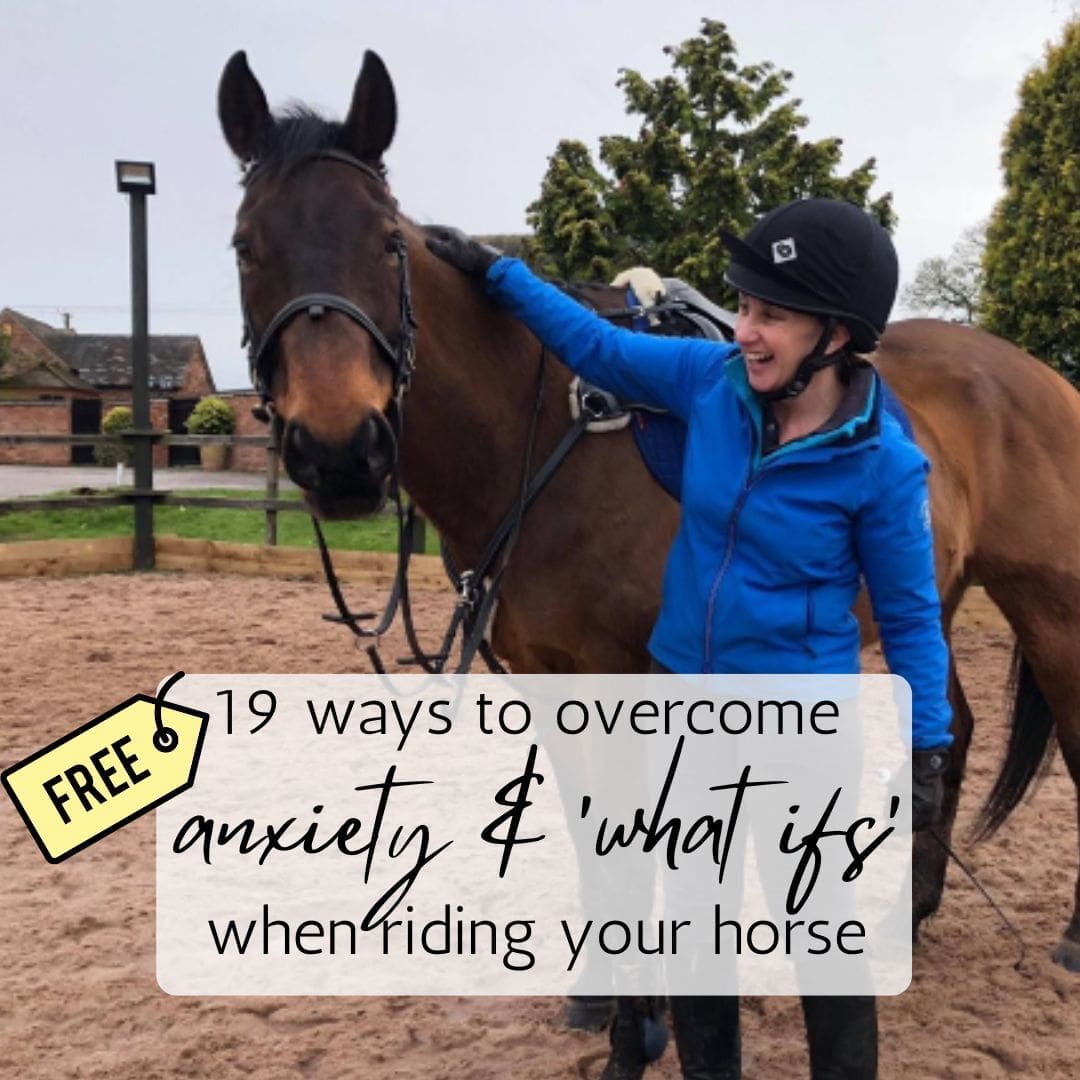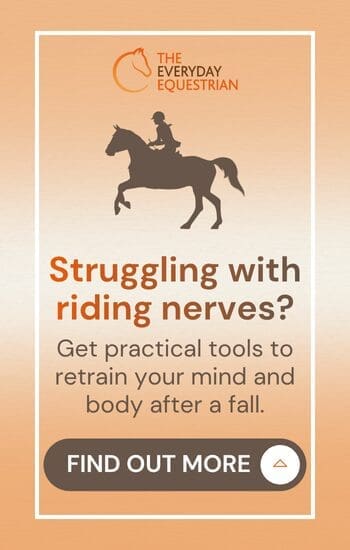Falling off a horse is an experience that many riders, no matter their level of expertise, are likely to face at some point. It’s simply a part of horse riding; if you’re going to be a horse rider, you have to understand that there is always a risk that you might fall off your horse! Falling is an inevitable part of equestrian activities, and every rider should be prepared for it. Falls and accidents can happen to anyone, even the most seasoned professionals. However, there are all kinds of sayings and ‘rules’ about falling off, so let’s debunk some of the most common misconceptions about falling off a horse.
We’ll dispel the most common myths about falling off, which often underpin all kinds of limiting beliefs and loss of confidence around riding. Whether you’re a happy hacker who enjoys exploring with your horse, or you’re a competitive rider out and about, changing your perception of falling off, can have a huge impact on how you feel and how much you enjoy riding your horse. Let’s dive in!
Horse Riding for All
Horse riding is enjoyed by people of all ages, whether for leisure, sport, or competition. While the bond between horse and rider can be incredibly special, it’s important to remember that horse riding comes with its own set of risks.
Falling off a horse is simply part of the journey for most riders. The key is to learn how to fall safely and to practice falling so that, when the moment comes, you’re prepared to minimise the risk of injury. Understanding the causes of horse falling and being proactive about your safety can make all the difference. In this article, we’ll explore why falls happen, how to reduce your risk, and the benefits of practicing safe falling techniques. Whether you’re just starting out or have been riding for years, being prepared is essential for every rider.
Safety Gear and Equipment
One of the most effective ways to reduce the risk of injury while horse riding is to wear the right protective equipment. A well-fitted helmet, made to a current safety standard, is essential for every rider, as it can protect your head from serious injury in the event of a fall. Riding boots are equally important – they help prevent your foot from getting stuck the stirrup – and many riders benefit from using safety stirrups too.
For added safety, many riders choose to wear air vests or body protectors, which can provide extra cushioning and support if you fall. It’s crucial to make sure all your gear is in good condition and fits properly, as ill-fitting equipment can compromise your safety. By consistently wearing the right protective equipment, you’re taking a proactive step to minimise the risk of head, foot, and other injuries, allowing you to focus on enjoying your ride with greater peace of mind.
So, with that said, let’d dive. into some of the biggest myths around falling off…
“You’re not a real rider until you’ve fallen off 7 times”
The saying “You’re not a real rider until you’ve fallen off 7 times” attempts to normalise falling as part of learning to ride. However, the truth is, being a great rider isn’t about how many times you’ve fallen; it’s about what you learn from each experience and how you apply that knowledge.
Falling off a horse can happen to anyone, regardless of their skill level, but it’s not a requirement or a milestone you need to achieve to prove yourself. Many experienced riders have fell at some point, and each fall can be a valuable learning experience. Instead, focus on continuously developing your riding skills, balance, security, application of the aids and your level of understanding of correct and ethical horse training and development.
Every time you ride, you have an opportunity for learn and improve. It’s also important to learn techniques for staying safe and responding appropriately if you do fall. Riding is about building a partnership with your horse, developing resilience when things don’t go as planned, and gaining confidence through every experience, not just the good times.
So, don’t worry about keeping a tally of your falls. Concentrate on enjoying your rides, learning from each experience, and becoming a knowledgeable and compassionate rider. This positive approach will make your riding journey more rewarding and enjoyable.
“You’re not a good rider if you fall off”
The myth that “you’re not a good rider if you fall off” is not only misleading but also unhelpful. Falling off a horse can happen to riders of all skill levels, from complete beginners to seasoned professionals. It’s a normal part of the learning process and not an indicator of your ability. The fear of falling is common among riders and can have a significant psychological impact, but addressing and managing this fear is key to regaining confidence after a fall.
Instead of seeing a fall as a setback, view it as an opportunity for growth and improvement. Each fall gives you insights into what might have gone wrong and how you can enhance your communication with your horse. This is crucial for developing a deeper understanding and better relationship with your horse.
Focus on the skills you’re gaining every time you ride. Building resilience when things don’t go as planned is an essential part of becoming a confident and capable rider. Remember, a good rider isn’t someone who never falls; a good rider is someone who learns from their experiences, embraces challenges, and continues to develop their skills with each ride.
No one actually wants to fall off their horse, but when we do, we have an opportunity to use the experience as a stepping stone to become a more knowledgeable and skilled rider. This approach will not only improve your riding but also help you bounce back even stronger! Overcoming fear is an important part of becoming a better rider, allowing you to move forward with greater confidence and safety.
“You should get straight back on your horse if you fall off”
The advice that “you should get straight back on your horse if you fall off” often comes from a well-meaning place, suggesting that you can quickly regain your riding confidence. However, this isn’t always the best or safest course of action.
When it’s appropriate to get back on:
If you’ve had a minor tumble and both you and your horse are unharmed, calm, and confident, getting back on can indeed be a good way to move past the incident. It helps prevent overthinking and reinforces to both you and your horse that you’re both OK.
When it isn’t appropriate to remount:
If there’s any evidence of injury to either you or your horse, it’s essential to take a moment to pause and assess the situation. Ignoring pain or discomfort can lead to more serious injuries for both you and your horse. Equally, the effects of adrenaline can easily mask injuries and pain after a fall. A fall can be a traumatic event for both horse and rider, sometimes resulting in not only physical injuries but also lasting psychological effects.
If your horse is stressed or anxious, or if the environment remains unsafe (e.g., slippery conditions, nearby traffic), attempting to remount can put you both at further risk.
After a fall, take a moment to evaluate how you’re feeling both physically and mentally. If you’re feeling shaken, it’s perfectly reasonable to take some time to recover your composure and ensure you’re mentally ready to ride again. There’s no hurry! Sometimes, taking a short break can be more beneficial for building resilience and maintaining confidence in the long run.
Use your judgement and take advice from people you trust, based on the circumstances. Every fall is different, and it’s entirely up to you as the rider, whether you choose to remount and continue. Some incidents, such as a bad fall, may require extra caution and a longer recovery period before getting back in the saddle. Of course, in affiliated competitions, riders are not allowed to remount following a fall, so you may have an enforced period of rest and recovery, whether you like it or not
Learning when to get back on and when to take a break, is part of becoming a knowledgeable and responsible rider. A balanced approach helps you develop a deeper understanding of your own and your horse’s needs, building resilience and trust in yourself and your judgement, which in turn builds confidence over time.=
Blaming yourself and beating yourself up each time you fall, isn’t fair to you and it won’t help you make progress or build your confidence. Instead, work on adjusting your perception of the fall and see it as an opportunity to learn and improve.
Rather than seeing a fall as a failure, view it as a chance to build resilience. Riding involves continuously learning and adapting, and resilience is about bouncing back stronger and more informed after setbacks.
Remember, every rider falls at some point, and it’s simply an opportunity to grow, develop your skills and build resilience.
“If you fall off, you’ll always get hurt”
The belief that “if you fall off, you’ll always get hurt” can be a daunting one and it might become a limiting belief that makes you reluctant to ride your horse. However, it’s important to understand that this isn’t always the case.
Falling off a horse doesn’t necessarily mean you will get injured. Many falls result in the rider getting up with nothing more than a bruise and a bit of dirt on their clothes. However, in some cases, falls can lead to life threatening injuries, highlighting the importance of safety. Of course, there’s always a risk of injury when falling, as with any physical activity, and serious injuries such as broken bones can occur. All kinds of factors can influence the outcome, including how you fall, the type of terrain, and the speed at which the incident occurs. Sometimes, injuries can be much worse than expected, making it crucial to be prepared and practice safe techniques.
There are plenty of things you can do to reduce the likelihood of injury:
-
Make sure you’re wearing a correctly fitted riding hat, up to a current safety standard
-
Your footwear should be suitable for riding, sturdy with a flat sole and small heel, to reduce the risk of your foot getting stuck in the stirrup
-
A correctly fitted body protector and/or air vest can also help you feel safer and more protected
-
Improve your riding; develop a secure, balanced seat which is independent of the reins in all paces, including jumping
-
Develop your horse’s training; a horse which is responsive, attentive, well-balanced and confident is not only a pleasure to ride, but is a much safer ride too!
-
Take proactive measures such as fall training and conditioning to reduce risk of injury during accidents or unexpected falls.
Rather than allowing worries about falling off to take up all your headspace, instead focus on building your confidence and resilience through learning, development and taking action. Understanding that falls can be part of learning helps you to accept them as challenges that you can overcome. Practicing proper falling techniques can help you avoid breaking bones and minimise injury. Each time you get back on the horse, you’re not just building your physical skills and confidence, but also reinforcing your mental resilience. Learning how to land safely is an important part of reducing injury risk.
Mastering the Art of Tuck and Roll
Learning how to fall safely is a vital skill for every horse rider, and mastering the art of tuck and roll can make a significant difference in reducing the risk of serious injury. The tuck and roll technique involves maintaining muscle tension throughout your body, tucking your chin to your chest to protect your neck, and rolling away from the point of impact to spread out the force of the fall.
Practicing this technique on a soft surface, such as a mat or sand arena, helps develop muscle memory and improves your reaction time when a real fall happens. Focusing on core strength, balance, and flexibility will also help you execute the tuck and roll more effectively. By making this technique second nature, you can minimise the risk of injury and feel more confident every time you ride. Remember, the more you practice falling, the better prepared you’ll be to handle unexpected situations safely.
“If I fall off, I’ll lose my confidence”
The idea that “If I fall off, I’ll lose my confidence” is a really common concern among riders, but it doesn’t have to be the reality. Falling off a horse can be challenging, but it doesn’t automatically mean your confidence will be affected. How you handle a fall can actually become a powerful tool in building your resilience and confidence.
Instead of viewing a fall as a setback, try to see it as a learning opportunity. Objectively review and analyse what led to the fall – was it a communication issue, a misjudgement or simply a lapse in focus? Sometimes, riders lose control when a horse unexpectedly rears or falls backward, and understanding how to respond in these situations is key to preventing injury and regaining confidence. Understanding the reasons behind a fall can provide valuable insights that improve your riding and help you prevent future incidents.
Each time you get back on the horse after a fall, you strengthen your resilience. It’s about managing the natural adrenaline response and shock, then taking time to manage your emotions and make an appropriate plan to move forward in a way that meets your needs and those of your horse. This resilience is a crucial aspect of confidence, not just in riding but in life in general.
Use the experience of a fall to refine your skills. Perhaps it highlights a need for more practice in a certain area or an adjustment in how you approach a particular riding technique. Working on these areas helps you become a better rider and, in turn, boosts your confidence.
Talk about the experience with your Coach or trusted friends. Often, they can offer advice, and different perspectives, provide reassurance, and a way forward. Reflecting on the fall with supportive community helps you realise that it’s a common part of learning to ride. It’s also important to teach people not just riding skills but fall safety techniques, so everyone is better prepared for unexpected situations.
Remember, falling off doesn’t have to be a confidence-ender. With the right mindset and approach, it can be a stepping stone to becoming a more skilled and confident rider. Practiced fall techniques can make you feel more prepared and secure, further building your confidence.
Benefits of Practice Falling
Incorporating practice falling into your horse riding routine is one of the best ways to prepare for the unexpected. Regularly practicing how to fall safely helps riders develop the skills and instincts needed to react quickly and protect themselves during a real fall. This not only reduces the risk of injury but also boosts your confidence and overall riding ability.
Practice falling improves your reaction time, increases your awareness of body position, and helps you stay calm under pressure. Riders who make practice falling a habit are better equipped to handle situations where the horse hits an obstacle or loses control. By dedicating time to practicing these techniques, you’ll become a more competent and confident horse rider, ready to face the challenges of horse riding with greater assurance and skill.
“I don’t bounce like I used to”
The saying “I don’t bounce like I used to” often reflects a natural concern among more mature riders or those returning to horse riding after a break. It’s true that as we age, our bodies might not recover from falls as quickly as they did when we were younger. However, this doesn’t mean that we can’t enjoy riding or should be overly concerned about falling.
Part of the solution is adjusting your approach; acknowledge that your body has changed, but also recognise that with age comes experience and wisdom. You can use this knowledge to ride smarter, not harder. Choosing the right horse, one that matches your needs and wants, then focus on what you can do and what you actually want to do. Stop comparing yourself to how you used to ride and enjoy the horse you have now.
Keeping yourself physically fit and agile through exercises tailored to flexibility and core strength can enhance your ability to handle falls better and recover more quickly. Protecting your shoulder during a fall is crucial to minimize injury. Turning your shoulders away from the direction of the fall can help facilitate a safer roll and reduce impact. Practicing landing on one shoulder can further decrease the risk of injury. Focusing on a controlled landing is essential for fall safety. If you have landed awkwardly, try to roll out of the impact to disperse the force. Practicing rolling after a fall helps develop muscle memory for safer recovery. Aim to return to your feet consistently after a fall to regain stability. Drills that involve dropping to one knee can help you practice controlled falls and safe body positioning. Avoid practicing falls on hard surfaces; use soft ground or mats to reduce injury risk. Always keep your chin tucked during a fall to protect your head and neck. Remember to maintain muscle tension as you fall, keeping your muscles engaged to absorb impact safely. Let go of the reins if you fall to avoid being dragged by the horse.
A well-fitted saddle is vital for maintaining stability and preventing unnecessary falls. Be aware of your horse’s neck position, especially during jumps, to anticipate movement and avoid accidents. Protect your head by keeping your heads tucked and shielded during a tumble. Many falls occur during jumps, so practice safe technique when approaching obstacles. If your horse has jumped enthusiastically, be prepared for sudden movements and maintain your balance.
Take things at your own pace. There’s no rush to jump back to the level of riding you were at years ago or to push yourself beyond your comfort zone prematurely. Gradually building up your riding sessions can help reinforce your skills and increase your confidence without overwhelming you.
In conclusion, falling off a horse doesn’t mean you’re a bad rider. It’s something that happens to everyone, whether you’re just starting out or you’ve been riding for years. Instead of seeing a fall as a setback, think of it as a chance to get better at riding. Learn from each fall, use it to improve your skills and communication with your horse, and build your ability to handle challenges. Riding is about learning and adapting, not staying on your horse every time. Embrace each experience as part of your growth and enjoy becoming a more skilled and confident rider.
If you’ve been struggling with your confidence after a fall from your horse, then check this out.
